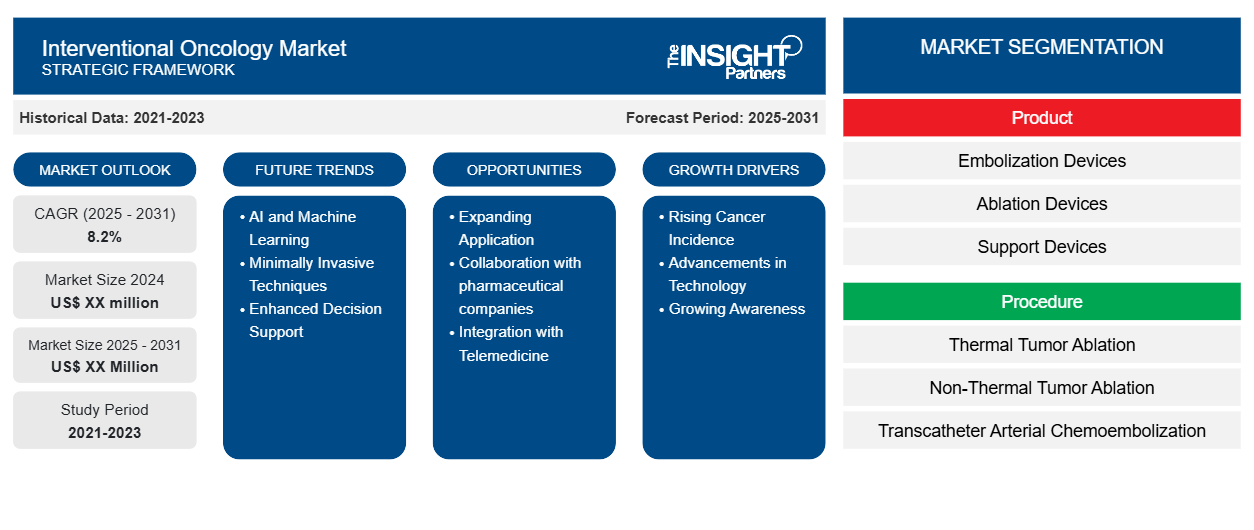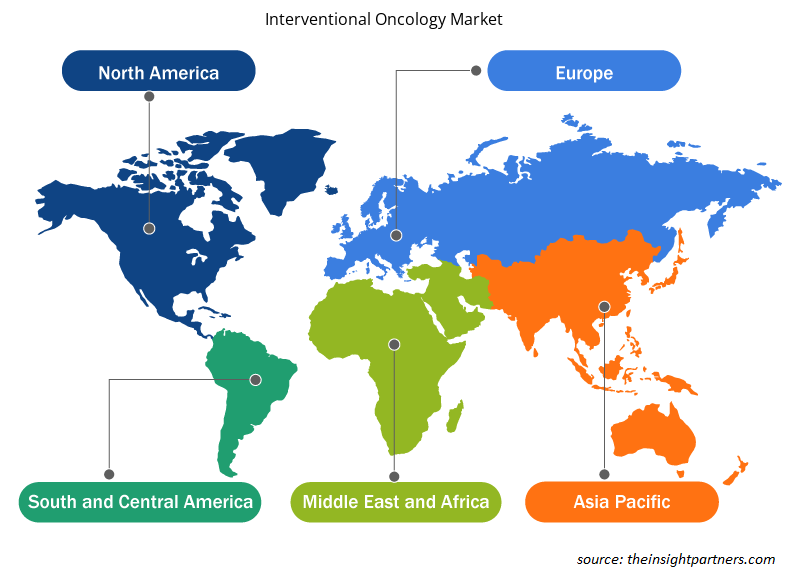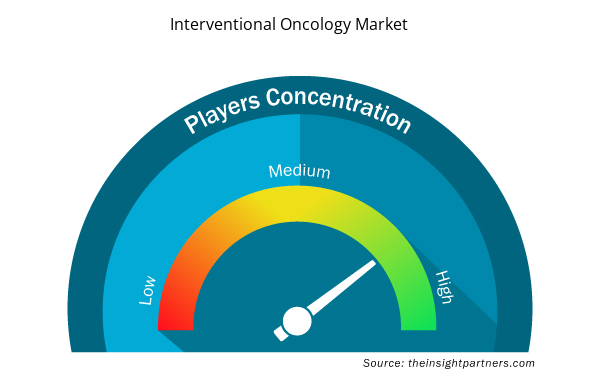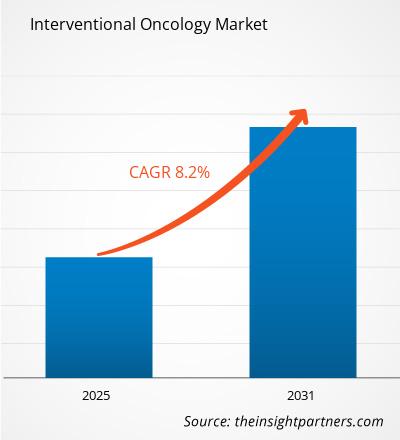The Interventional Oncology Market is expected to register a CAGR of 8.2% from 2025 to 2031, with a market size expanding from US$ XX million in 2024 to US$ XX Million by 2031.
The report is segmented by Product (Embolization Devices, Ablation Devices, Support Devices). The report further presents analysis based on the Procedure (Thermal Tumor Ablation, Non-Thermal Tumor Ablation, Transcatheter Arterial Chemoembolization, Transcatheter Arterial Radioembolization or Selective Internal Radiation Therapy, Transcatheter Arterial Embolization or Bland Embolization). The report is segmented by Cancer Type (Liver Cancer, Lung Cancer, Bone Cancer, Kidney Cancer, Other Cancers). The global analysis is further broken-down at regional level and major countries. The Report Offers the Value in USD for the above analysis and segments.
Purpose of the Report
The report Interventional Oncology Market by The Insight Partners aims to describe the present landscape and future growth, top driving factors, challenges, and opportunities. This will provide insights to various business stakeholders, such as:
- Technology Providers/Manufacturers: To understand the evolving market dynamics and know the potential growth opportunities, enabling them to make informed strategic decisions.
- Investors: To conduct a comprehensive trend analysis regarding the market growth rate, market financial projections, and opportunities that exist across the value chain.
- Regulatory bodies: To regulate policies and police activities in the market with the aim of minimizing abuse, preserving investor trust and confidence, and upholding the integrity and stability of the market.
Interventional Oncology Market Segmentation
Product
- Embolization Devices
- Ablation Devices
- Support Devices
Procedure
- Thermal Tumor Ablation
- Non-Thermal Tumor Ablation
- Transcatheter Arterial Chemoembolization
- Transcatheter Arterial Radioembolization or Selective Internal Radiation Therapy
- Transcatheter Arterial Embolization or Bland Embolization
Cancer Type
- Liver Cancer
- Lung Cancer
- Bone Cancer
- Kidney Cancer
- Other Cancers
Geography
- North America
- Europe
- Asia-Pacific
- South and Central America
- Middle East and Africa
Customize This Report To Suit Your Requirement
You will get customization on any report - free of charge - including parts of this report, or country-level analysis, Excel Data pack, as well as avail great offers and discounts for start-ups & universities
Interventional Oncology Market: Strategic Insights

- Get Top Key Market Trends of this report.This FREE sample will include data analysis, ranging from market trends to estimates and forecasts.
Interventional Oncology Market Growth Drivers
- Rising Cancer Incidence: Interventions oncology is driven by one of the critical factors through the increased incidence of cancer, especially global cancer rates which call for an urgent requirement for better and less invasive treatment strategies. Procedures under interventional oncology include ablation and embolization that are targeted therapies with minimum trauma to the patient and recovery time. This increased prevalence contributes to awareness among providers and patients, as well as investment in innovative technologies and techniques. It encompasses both an aging population and lifestyle factors that drive cancer rates, which means the demand for interventional oncology solutions has expanded steadily to position this field for significant growth and development over the next several years.
- Advancements in Technology: Technological advancements are revolutionizing the interventional oncology market with more effectiveness and accuracy in cancer treatment methods. For example, better visualization of tumors through high resolution MRI and CT, targeted interventions, and more success rates in cancer treatment methods through high resolution MRI and CT. Minimally invasive tools such as radiofrequency ablation and cryoablation devices are receiving advanced types to improve patient outcomes and reduce recovery time. Moreover, robotics and artificial intelligence have made procedures smoother, aided in decision making, and ensured proper planning before intervention. All these technological advancements will make treatments more efficient and more applicable in more fields of varied kinds of cancers to thus promote further development in the field and change the outlook of patient care in interventional oncology.
- Growing Awareness: There is a huge impact of rising awareness about interventional oncology on the growth of its market. Increasing knowledge among medical professionals and patients of minimally invasive treatment modalities is driving the uptake and acceptance of these procedures. Educating programs, medical conferences, and electronic media that have spread information concerning the advantages of interventional oncology, such as reduced recovery time and fewer complications compared to other surgeries, is also a driving force that boosts market growth. The patient advocacy groups can also assist in generating awareness and inform patients about their treatment alternatives. Awareness increased and continues to do so, which fuels the demand for new treatments, encourages the active engagement of stakeholders, and enhances the cancer care landscape as a whole.
Interventional Oncology Market Future Trends
- AI and Machine Learning: AI and machine learning change the interventional oncology market by enhancing diagnosis accuracy and personalizing treatment. Enhanced analysis of images thus improves the detection and characterization of tumors. Predictive analytics helps in making personalized recommendations based on data from the patient. Automated clinical workflows improve efficiency within healthcare settings. Real-time decision support technologies can be used during interventional oncological procedures for improved safety and outcomes. In addition, AI allows for the stratification of patients. It reveals those most likely to be benefited by specific interventions. That technology, when used in electronic health records, optimizes clinical trials and encourages a more involved patient-all contributing toward better patient care and outcomes with interventional oncology.
- Minimally Invasive Techniques: Minimally invasive techniques have long provided revolutionary alternatives in the interventional oncology market, as effective alternatives to traditional surgeries. Procedures like radiofrequency ablation, microwave ablation, and transarterial chemoembolization allow the proper targeting of tumors with a considerable decrease in recovery time and less pain post-surgery. This improves patient safety and results in faster returns to daily activity. Advanced imaging technology ensures precise targeting of lesions, while reducing trauma through endoscopy and catheter-guided interventions. Interest in the overall treatment strategies for oncology continues to grow as a minimally invasive option based on the trend for personalised, patient-centered care.
- Enhanced Decision Support: Greater decision support in the interventional oncology market employs sophisticated algorithms and AI to gain insights at the right time of procedure performance. These systems analyze patient data and image analysis results to provide recommendations to assist clinicians in decision making. The combined clinical guidelines with historical outcomes streamline treatment plans specific to the individual patient, thereby making the procedures more precise for targeting tumors with fewer complications. Further, these technologies offer opportunities for multidisciplinary collaboration and ensure that all healthcare providers are on the same page as regards the best course of action. Overall, better decision support contributes to improved patient outcomes and boosts the confidence of medical teams.
Interventional Oncology Market Opportunities
- Expanding Application: Expanding applications of interventional oncology are revolutionizing the market, and increasingly treatable tumors are increasing. Techniques that are originally applied to liver cancers are now efficaciously being used for treatment against lung, kidney, and bone cancers, among others. This diversification is due to improvements made in imaging and technology that improve precision during treatment. Additionally, interventional methods such as ablation and embolization are increasingly being combined with systemic therapies to provide comprehensive treatment options. As more clinical evidence on these applications begins to surface, health care providers are likely to take up interventional oncology as an ordinary treatment, and that will lead to further market growth and better care of patients with various cancers.
- Collaboration with pharmaceutical companies: The interventional oncology companies are collaborating with pharmaceutical companies to establish some very big market opportunities. Here, such collaboration integrates innovative interventional techniques with pharmaceutical therapies such as immunotherapy and targeted agents, which improves the effectiveness of the treatment and makes more holistic care options available for patients. Such collaborations are on the mechanisms to develop combination therapies with a focus to streamline the treatment protocols and work towards improving clinical outcomes. Moreover, collaborative research efforts may lead to the discovery of new therapies and better stratification of the patient population. Over time, such collaborations are likely to push interventional oncology to new horizons, which may further have an impact on patients and health care organizations by providing better targeted and effective therapeutic management.
- Integration with Telemedicine: Telemedicine and remote monitoring revolutionize the interventional oncology market in more ways than one with improvement of access to care for patients. These technologies lead to pre- and post-procedure consultations where advice is given to patients by specialists irrespective of distance. The remote monitoring tool has enabled healthcare providers to track the progression of patients, manage complications promptly, and intervene to address issues as timely as possible. Telehealth platforms also support educating the patient and engaging them in better understanding the available treatment options. The advancement of these technologies will be an integral part of the improvement in the outcome of patient care and increased workflows and delivery of interventional oncology services to various populations.
Interventional Oncology Market Regional Insights
The regional trends and factors influencing the Interventional Oncology Market throughout the forecast period have been thoroughly explained by the analysts at Insight Partners. This section also discusses Interventional Oncology Market segments and geography across North America, Europe, Asia Pacific, Middle East and Africa, and South and Central America.

- Get the Regional Specific Data for Interventional Oncology Market
Interventional Oncology Market Report Scope
| Report Attribute | Details |
|---|---|
| Market size in 2024 | US$ XX million |
| Market Size by 2031 | US$ XX Million |
| Global CAGR (2025 - 2031) | 8.2% |
| Historical Data | 2021-2023 |
| Forecast period | 2025-2031 |
| Segments Covered |
By Product
|
| Regions and Countries Covered | North America
|
| Market leaders and key company profiles |
Interventional Oncology Market Players Density: Understanding Its Impact on Business Dynamics
The Interventional Oncology Market market is growing rapidly, driven by increasing end-user demand due to factors such as evolving consumer preferences, technological advancements, and greater awareness of the product's benefits. As demand rises, businesses are expanding their offerings, innovating to meet consumer needs, and capitalizing on emerging trends, which further fuels market growth.
Market players density refers to the distribution of firms or companies operating within a particular market or industry. It indicates how many competitors (market players) are present in a given market space relative to its size or total market value.
Major Companies operating in the Interventional Oncology Market are:
- BTG International Ltd.
- HealthTronics, Inc.
- IceCure Medical Ltd
- IMBIOTECHNOLOGIES LTD.
- Medtronic
Disclaimer: The companies listed above are not ranked in any particular order.

- Get the Interventional Oncology Market top key players overview
Key Selling Points
- Comprehensive Coverage: The report comprehensively covers the analysis of products, services, types, and end users of the Interventional Oncology Market, providing a holistic landscape.
- Expert Analysis: The report is compiled based on the in-depth understanding of industry experts and analysts.
- Up-to-date Information: The report assures business relevance due to its coverage of recent information and data trends.
- Customization Options: This report can be customized to cater to specific client requirements and suit the business strategies aptly.
The research report on the Interventional Oncology Market can, therefore, help spearhead the trail of decoding and understanding the industry scenario and growth prospects. Although there can be a few valid concerns, the overall benefits of this report tend to outweigh the disadvantages.
- Historical Analysis (2 Years), Base Year, Forecast (7 Years) with CAGR
- PEST and SWOT Analysis
- Market Size Value / Volume - Global, Regional, Country
- Industry and Competitive Landscape
- Excel Dataset


- Occupational Health Market
- Health Economics and Outcome Research (HEOR) Services Market
- Europe Industrial Chillers Market
- Volumetric Video Market
- Aquaculture Market
- Collagen Peptides Market
- Blood Collection Devices Market
- Dealer Management System Market
- Energy Recovery Ventilator Market
- Fixed-Base Operator Market

Report Coverage
Revenue forecast, Company Analysis, Industry landscape, Growth factors, and Trends

Segment Covered
This text is related
to segments covered.

Regional Scope
North America, Europe, Asia Pacific, Middle East & Africa, South & Central America

Country Scope
This text is related
to country scope.
Frequently Asked Questions
Embolization Devices segment, by type, dominated the market in 2023.
North America region dominated the interventional oncology market in 2023.
Expanding Application act as a opportunity for growth of the market in forecast period.
The Interventional Oncology Market is estimated to witness a CAGR of 8.2% from 2023 to 2031
The major factors driving the interventional oncology market are:
1. Rising Cancer Incidence
2.Advancements in Technology
Players operating in the market are BTG International Ltd, HealthTronics, Inc, IceCure Medical Ltd, IMBIOTECHNOLOGIES LTD, Medtronic, MedWaves, Inc., Sanarus, and Teleflex Incorporated
Trends and growth analysis reports related to Life Sciences : READ MORE..
1. BTG International Ltd.
2. HealthTronics, Inc.
3. IceCure Medical Ltd
4. IMBIOTECHNOLOGIES LTD.
5. Medtronic
6. MedWaves, Inc.
7. Sanarus
8. Teleflex Incorporated
9. Terumo Corporation
10. Trod Medical

 Get Free Sample For
Get Free Sample For